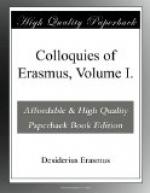Eu. Your Discourse is, indeed, answerable to your Name, and one that knows how to propound Questions as you do, has no Need of any Body to answer them but himself. For you have so proposed your Doubts, as to put one quite out of doubt, altho’ St. Paul, in that Epistle, (proposing to handle many Things at once) passes often from one Argument to another, repeating what he had intermitted.
Ch. If I were not afraid, that by my Loquacity I should divert you from eating your Dinners, and did think it were lawful to intermix any Thing out of profane Authors with sacred Discourses, I would venture to propose something that I read to Day; not so much with Perplexity, as with a singular Delight.
Eu. Whatsoever is pious, and conduces to good Manners, ought not to be called profane. The first Place must indeed be given to the Authority of the Scriptures; but nevertheless, I sometimes find some Things said or written by the Antients; nay, even by the Heathens; nay, by the Poets themselves, so chastly, so holily, and so divinely, that I cannot persuade myself, but that when they wrote them, they were divinely inspired; and perhaps the Spirit of Christ diffuses itself farther than we imagine; and that there are more Saints than we have in our Catalogue. To confess freely among Friends, I can’t read Tully of Old Age, of Friendship, his Offices, or his Tusculan Questions, without kissing the Book, and Veneration for that divine Soul. And on the contrary, when I read some of our modern Authors, treating of Politics, Oeconomics and Ethics, good God! how cold they are in Comparison of these? Nay, how do they seem to be insensible of what they write themselves? So that I had rather lose Scotus and twenty more such as he, than one Cicero or Plutarch. Not that I am wholly against them neither; but because, by the reading of the one, I find myself become better; whereas, I rise from the other, I know not how coldly affected to Virtue, but most violently inclin’d to Cavil and Contention; therefore never fear to propose it, whatsoever it is.
Ch. Although all Tully’s Books of Philosophy seem to breathe out something divine; yet that Treatise of Old Age, that he wrote in old Age, seems to me to be according to the Greek Proverb; the Song of the dying Swan. I was reading it to Day, and these Words pleasing me above the rest, I got ’em by Heart: Should it please God to give me a Grant to begin my Life again from my very Cradle, and once more to run over the Course of my Years I have lived, I would not upon any Terms accept of it: Nor would I, having in a Manner finished my Race, run it over again from the starting Place to the Goal: For what Pleasure has this Life in it? nay, rather, what Pain has it not? But if there were not, there would be undoubtedly in it Satiety or Trouble. I am not for bewailing




